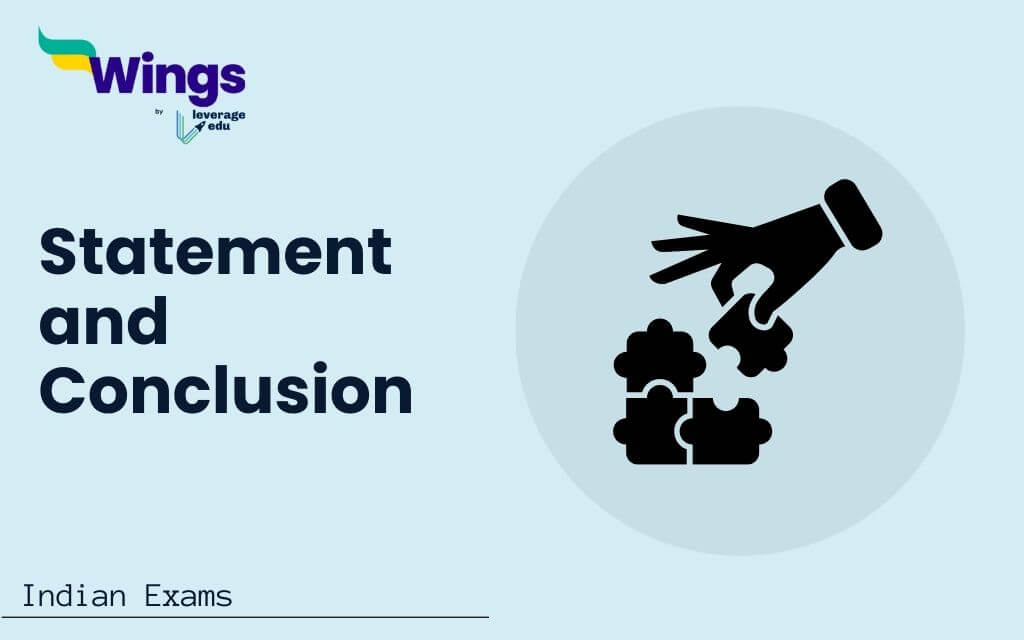Questions of Statement and Conclusion: is a crucial component of many competitive exams, challenging candidates to think critically and draw logical inferences from given statements. This type of question tests your ability to evaluate the relationship between various statements and determine whether a given conclusion logically follows. In this blog, we will delve into Statement and Conclusion Reasoning, exploring what it entails and sharing strategies to help you tackle these questions effectively.
Moreover, we’ve prepared 20+ practice questions with their answers to give you ample opportunities for exam prep and study material.
What is Statement and Conclusion Reasoning?
Statement and Conclusion Reasoning, often found in aptitude tests, bank exams, and government job entrance exams, assesses your ability to analyse statements and deduce whether a given conclusion is valid based on the information provided. The statements are factual, and the conclusions are drawn logically from them.
These questions are designed to evaluate your critical thinking skills, ability to recognize valid conclusions, and discern between what can be reasonably deduced from the information presented and what cannot.
Strategies to Solve Statement and Conclusion Reasoning Questions
- Identify Keywords: Look for keywords that can help you understand the direction of the conclusion. Keywords like ‘therefore,’ ‘hence,’ ‘because,’ and ‘so’ often indicate the reasoning behind the conclusion.
- Analyze Logic: Assess the logical connection between the statements and the conclusion. Does the conclusion follow logically from the given statements? If not, it’s likely incorrect.
- Consider All Possibilities: Keep an open mind and consider all possible conclusions. Sometimes, the correct conclusion may not be the most obvious one.
- Use Negation: If you need clarification on the validity of a conclusion, try negating it. If the negated conclusion contradicts the given statements, the original conclusion is likely correct.
Must Read: Types of Reasoning Questions in Competitive Exams – Leverage Edu
20+ Practice Questions on Statement and Conclusion Reasoning
- Statement: All cats have tails.
Conclusion: All animals with tails are cats.
Answer: False
- Statement: Some birds can fly.
Conclusion: All birds can fly.
Answer: False
- Statement: All men are mortal.
Conclusion: Socrates is a man, so he is mortal.
Answer: True
- Statement: Some students are diligent.
Conclusion: All students are diligent.
Answer: False
- Statement: All roses are red.
Conclusion: This flower is red; therefore, it is a rose.
Answer: False
- Statement: All reptiles lay eggs.
Conclusion: Birds are reptiles because they lay eggs.
Answer: False
- Statement: No human can fly.
Conclusion: We are humans, so we can’t fly.
Answer: True
- Statement: Some fruits are juicy.
Conclusion: All juicy things are fruits.
Answer: False
- Statement: All A’s are B’s.
Conclusion: Some B’s are A’s.
Answer: True
- Statement: All doctors are educated.
Conclusion: Some educated people are doctors.
Answer: True
- Statement: All politicians are cunning.
Conclusion: Some cunning people are politicians.
Answer: True
- Statement: No dog can climb trees.
Conclusion: Rover is a dog, so he can’t climb trees.
Answer: True
- Statement: All athletes are strong.
Conclusion: Maria is strong; therefore, she is an athlete.
Answer: False
- Statement: Some students are musicians.
Conclusion: All musicians are students.
Answer: False
- Statement: All cars run on gasoline.
Conclusion: This vehicle runs on gasoline; therefore, it’s a car.
Answer: True
- Statement: All pencils are stationary.
Conclusion: This is a pencil; therefore, it’s stationary.
Answer: True
- Statement: No snakes have legs.
Conclusion: This creature has legs; therefore, it’s not a snake.
Answer: True
- Statement: Some flowers are blue.
Conclusion: All blue things are flowers.
Answer: False
- Statement: All lawyers are argumentative.
Conclusion: Mark is argumentative; therefore, he’s a lawyer.
Answer: False
- Statement: Some books are bestsellers.
Conclusion: All bestsellers are books.
Answer: False
- Statement: No reptiles can fly.
Conclusion: Birds can fly; therefore, they are not reptiles.
Answer: True
- Statement: All planets orbit the sun.
Conclusion: The moon orbits the sun, so it’s a planet.
Answer: False
- Statement: Some mathematicians are geniuses.
Conclusion: All geniuses are mathematicians.
Answer: False
- Statement: All oceans are salty.
Conclusion: This body of water is salty; therefore, it’s an ocean.
Answer: False
- Statement: No humans have feathers.
Conclusion: This creature has feathers, so it’s not a human.
Answer: True
Also Read: 20+ Questions of Logical Problems Reasoning | Leverage Edu
Statement and Conclusion Reasoning is a fundamental aspect of many exams, requiring candidates to think critically and draw logical conclusions from the provided information. With consistent practice, you can master this skill and boost your exam-prep efforts. For more such study material on Indian Exams, check out Leverage Edu!


 One app for all your study abroad needs
One app for all your study abroad needs












 60,000+ students trusted us with their dreams. Take the first step today!
60,000+ students trusted us with their dreams. Take the first step today!